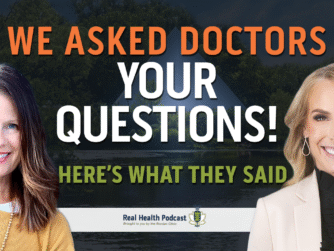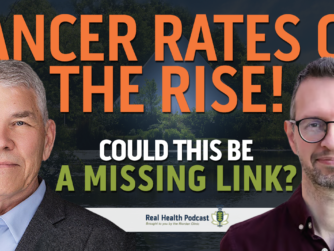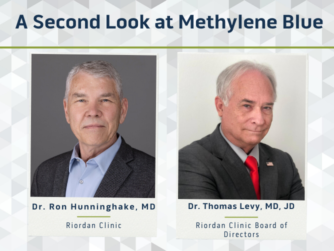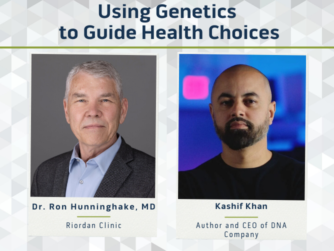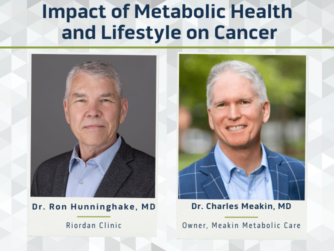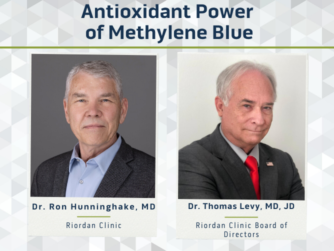In the latest episode of the Real Health Podcast, Dr. Ron Hunninghake, MD, talks with Dr. Paul Anderson, NMD, a recognized educator and clinician, about his roots in general practice and naturopathic and integrative oncology and how patients can build a foundation to help themselves.
Watch the Video
Thanks to this Episode’s Sponsor
Bio-Center Laboratory: https://biocenterlab.org/
Links
Learn more about the host:
Dr. Ron Hunninghake: https://riordanclinic.org/staff/ron-hunninghake-md/
Learn more about the guest:
Dr. Paul Anderson, MD: https://www.consultdranderson.com/
https://www.consultdranderson.com/about/
https://www.youtube.com/channel/UC1FLIaKDzkU5Z0knDYYKyPQ
Interested in becoming a Patient: https://riordanclinic.org/request-an-appointment/
Learn more about Riordan Clinic: https://riordanclinic.org
Read the Transcript
Disclaimer: The information contained on the Real Health Podcast and the resources mentioned are for educational purposes only. They’re not intended as and shall not be understood or construed as medical or health advice. The information contained on this podcast is not a substitute for medical or health advice from a professional who is aware of the facts and circumstances of your individual situation. Information provided by hosts and guests on the Real Health Podcast or the use of any products or services mentioned does not create a practitioner patient relationship between you and any persons affiliated with this podcast.
Intro: This is the Real Health Podcast brought to you by Reardon Clinic. Our mission is to bring you the latest information and top experts in functional and integrative medicine to help you make informed decisions on your path to real health.
Dr, Ron Hunninghake: Well welcome everyone to another episode of the Real Health Podcast. I’m Dr. Ron Hunninghake. I’m the Chief Medical Officer here at Riordan Clinic. And wow, we have a great program lined up today because our guest is Dr. Paul Anderson, a recognized educator and clinician in integrative and naturopathic medicine with a focus on complex infections, chronic, and especially oncology cancer illness. In addition to three decades of clinical experience, he was head of the interventional arm of the US NIH-funded human research trial testing IV and integrative therapies in cancer patients. So Paul, or Dr. A as you’d like to go by, Dr. Ron, Dr. A, welcome to our show.
Dr. Paul Anderson: Thanks so much for having me.
Dr. Ron Hunninghake: So you and I actually go back quite a ways. I was giving talks out in California on IV vitamin C, and you’ve done a whole lot with IV vitamin C as well. What was your introduction to the integrative care of cancer patients?
Dr. Paul Anderson: It was one of those things where it happened as opposed to me planning it. And the shortest version is when I went into practice, my plan was to completely be kind of an old-time general practitioner. And I practiced in a rural area of the state of Oregon on the West Coast. And that was going along great, but I also had training as a naturopathic physician, and so I wanted to blend the two. And what happened that I was not expecting all within the really the first year of practice is people started showing up with all manner of things that did not fit into the general practice mode, one of which was cancer. And although you go back a number of decades, there were some things we knew about cancer and integrated medicine, et cetera. It was a pretty nascent new kind of science then.
So I think I had to either decide I wasn’t going to do that, but I had a very hard time telling people, “Oh no.” There was nowhere else to go, really, in the northwest. There may have been 10 people – maybe –doing it. So I figured, well then, the other option is I have to learn, and I have to get up to speed. And as you know, back in those days, there were a very, you could count on one hand the number of resources for anybody doing any of this. So I think we all from that generation, we all learned together. And then what happened, of course, which I’m sure you saw too, is once, regardless of the outcome, regardless of how anything else goes, once you have your first few patients and they tend to be very advanced.
Dr. Ron Hunninghake: Word gets out.
Dr. Paul Anderson: The word gets out. And like I say, most of my initial patients, literally the oncologist had said, “Hey, we’re done. There’s nothing we can do. Go find something else.” So I was something else. Literally, it’s like being thrown in at the other end of the pool and working your way backwards. And there’s benefits to that. I don’t know I’d choose to do it that way again. But that’s basically what happened. And then once you start to gain tiny bits of knowledge and a little bit even more people come, and that’s literally how it developed. But
Dr. Ron Hunninghake: You had a foundation in naturopathic medicine in terms of helping people try to elicit the health response. Let’s just put it that way because that was what was unique about the Riordan Clinic is hey, we were doctors interested in health. I mean, it sounds crazy to say it that way, but the truth is that you had health things that people could do. And I was wondering, did you fall back on that just in terms of good eating, get your sleep, and a lot of what we are now calling terrain and metabolic therapy, that’s pretty natural stuff, so to speak to the naturopathic approach.
Dr. Paul Anderson: Yeah, I would say a 100 percent. And again, if you go back to the very beginning where we were, one of the early things I did just like you is intravenous vitamin C, what people would ask for. And I had a background that involved IV and parental therapies and hospital training and stuff like that. So that wasn’t a big deal, but that was in the setting of all the other things that you just mentioned, which now we look at as integrative oncology, looking at your diet and looking at your circadian rhythm and sleep, and looking at your stress and using things like maybe botanical herbal medicines or other types of natural things just to support your body. And very early on, one of the things I would tell patients is I am more concerned with the cells in your body that don’t have cancer than the cells that do. Now of course we want to work on the cells that have cancer, but it’s the healthy cells in your body that keep you from getting sicker and keep you here longer. And so that’s why we really want to keep the healthy part of you healthy. And I think they really tied into that, which probably is why I kept using that as sort of an analogy. But yeah, that’s really where that came from.
And I also have to give, I think my mother and father passed away. They would be in their hundreds now if they hadn’t have, probably. But my father’s a physician, traditionally trained; mom was a nurse. But they had sort of evolved over their lifetime of practice to more of an integrative-minded approach. And so back in the 50s and 60s, that wasn’t a real well accepted thing. So they’re very quiet about it, but that also had a very big influence on me. And so I grew up that way, even though that wasn’t maybe the way they practiced out in the world. And so when I found naturopathic medicine and my naturopathic training, it really resonated with me that I could take the best of the mechanical sciences, I call them, of the allopathic world, and then all of the other things that you don’t do in that world very much and try and put ’em together. So that’s really where our cancer care started.
Dr. Ron Hunninghake: But you know, what you did bring and what I think Dr. Riordan and people like David Servan-Schreiber in his anti-cancer book, what you did bring was more science. I think a lot of doctors would say that a lot of what was being done in the natural realm was more like you said, folklore, folk medicine, and nothing, no science-based basis to it. But yet our daughter did one year of naturopathic school, and I went to visit and went to a number of the classes. I was blown away. These were medical school classes. And I think a lot of doctors think that naturopathic medicine is just folklore, but it’s not. It’s very science-based. And I think this represented a major growth and improvement in what patients could get. They could get something that had some science behind it. And I know that’s been a big part of your career as well.
Dr. Paul Anderson: And I mean if we go back, say 20-plus years, there was emerging science in the world of integrative oncology, but there wasn’t a lot, really. We really had to piece together a lot of stuff. And then all of the sudden there were the publications on botanical medicines and even IV vitamin C and other things that we do started to get bigger and bigger. And so when Dr. Stengler and I wrote our book Outside the Box, we specifically referenced it. We wrote it for patients, but we referenced it for their oncologist. And so it’s got like 1,100 peer-reviewed references in it because what is it that we hear when somebody goes to the oncologist? Well, there’s no science,
Dr. Ron Hunninghake: There’s no research on it. Yeah.
Dr. Paul Anderson: There is. So we thought, well, let’s answer both questions. We’ll make a very readable book for the patient, and the patient could just hand it to their oncologist and say, well, some of these have to be reasonable papers. Yeah. And I think that in the beginning, I was so busy practicing, we all know how that is, you’re trying to keep your patients going. I didn’t have a ton of time to sit down and put things together and read research and all that. So I relied on other folks. But what happened over time then is sort of a head of steam picked up behind that. And I started to be sort of the collector of information a bit in my little community. And then when I was recruited into the NIH trial that we did in integrative oncology, specifically to do the IV therapy, because they started the trial, and they realized IV therapy was kind of a specialty, and they should get someone who’d done it before.
Well, then that opened a Pandora’s box because we were one of a number of universities together, University of Washington, Fred Hutchinson, Seattle Children’s, SECA. So we all answered to each other. And so suddenly I had to justify using IV vitamin C or any other IV. We did all sorts of IVs of natural things to my very hardcore medical oncology colleagues. And that then just sort of took it from here to many orders of magnitude higher because I built on what we had and then I added to it. And so not because again, I sat down and thought this would be a great idea to do. It was more survival in keeping our patients cared for within the bigger system of oncology. And what I noticed with that though was there was really only two responses when I would provide data.
Either the person was just stuck in their way of thinking, and they would say, “Well, I don’t care. I’m still not going to support you.” Or I had the chief of oncology say, “I didn’t even know there was any research about this stuff,” literally. And he says, I have no problem sending patients to you now. And he started sending people to us for IV vitamin C and other stuff just because he was not aware. He was never told in all of his oncology training, there was any research. So I think it’s tough to do. It’s tough to get it together, but when you get that and you have an open-minded colleague, you can build some bridges, which is what I would love to see.
Advertisement: There’s a lot more to this conversation and it’s coming up right after a quick break. Today’s podcast is brought to you by Bio Center Laboratories. The Bio Center Laboratory provides state-of-the-art lab testing and diagnostic services for healthcare providers, laboratories, hospitals, and the general public. Lab tests available through Bio Center include a comprehensive list of vitamins, minerals, fatty acids, amino acids, hormones, and pyros. They also provide a variety of standardized tests for disease markers. These markers include cardiovascular disease, diabetes, thyroid dysfunction, hormone imbalance, and more. Visit biocenterlab.org to learn more.
Dr. Ron Hunninghake: Well and also make better decisions in the ongoing care. Even if you’re like with us, we were predominantly doing the naturopathic or the natural approach, but cancer patients can go south in a day, things can start happening where you definitely need the specialty of oncology to step in there and help out. And so the blend of integrative and regular oncology is truly a necessity. We just recently hired Dr. Stacy Dunn, who’s up in Oregon for she said 20 years, and she actually said she was doing more oncology than she was doing naturopathic, even though, yes, she was blending it. But I think it’s a very important step forward, and I think patients are starting to recognize the advantages of going to a doctor that is well-versed in both. And that’s the way I think of you, Paul, that you represent that big step forward in terms of giving scientific verification to how well integrative medicine could compliment regular oncology. I mean, that’s the irony here is I always say we could really make the oncologists look good if they would pay attention to the natural side of things.
Dr. Paul Anderson: I would agree. And again, I didn’t plan it that way, but I’m glad that that is what I stepped into. And I’ll say one of my, I don’t know proudest moments, but one of my most amusing moments throughout the NIH trial is five years long. And when the government’s involved, everything’s very public, and we’re dealing with tier-one medical schools and the best science and researchers, my biggest loudest critic in the medical oncology side, and I won’t elaborate on all the things he would say, but biggest loudest critic, easy. Two years into the study, he called me and he said, I still don’t agree with what you do. It’s always good to start a conversation that way.
Dr. Ron Hunninghake: That’s the way it seems like. They always start it.
Dr. Paul Anderson: And he says, but I will say that the patients I share with you seem to do better and live longer. He says, so while I don’t agree with your way of practicing, you have me intellectually curious.
Dr. Ron Hunninghake: And that’s a giant step forward, right? There is a giant step forward.
Dr. Paul Anderson: That’s intellectual curiosity is how it all starts for all of us, right?
Dr. Ron Hunninghake: And quality of life, I mean in the final analysis that isn’t that what every sick patient, not just cancer patients, but they just, “Hey, doctor, please help me. I’m feeling awful. What can I do?”
Dr. Paul Anderson: And so I mean, everybody who’s sick or well wants quality of life. It’s just when you’re sick, it becomes much more of an acute issue.
Dr. Ron Hunninghake: Yeah, you’re willing to go the extra mile then.
Dr. Paul Anderson: And the way some of the oncologists would look at it is, gee, I can do a full standard of care protocol on a patient I share with you, and they don’t fall out because of side effects, and they don’t fall out because of other adverse events. And so just that alone is a win on their side. And if indeed the standard care protocol, say it says, has one of those real high levels of success like we see in early-stage breast cancer, early-stage prostate, testicular cancer, things like that, great. If we can get them all the way through, and then we can fix them up on the other side, that’s using the best of what everybody has to offer. And that’s really, I think it just makes logical sense to me that that’s the middle of where we come from. There’s stuff on the edge where we all know there’s standard of care that’s got 4 or 5 percent chance of doing anything. So we can play a huge role there, that standard of care. And then there’s things way on the other side where standard of care has a real high percent, but the things we do can keep them healthy longer. So I think it’s just a matter of it’s not a yes or no answer to anybody. It’s where do we fit in? Where does standard of care fit in and how do we make it work the best for you?
Dr. Ron Hunninghake: So given that, I wish we had all afternoon here to talk and we don’t, but given what you just said, where do you think integrative medicine is shining the most right now? What? What’s happening from your perspective in terms of terrain therapy, the theory of terrain and metabolic cancer? Anything standing out to you that our listeners should know about from your perspective?
Dr. Paul Anderson: Yeah, what I have come, and this was about 25 years working with cancer patients and then taking a bit of time to look backward and wrote a few books. And so you have to think a little about what you’ve been doing. What I tell patients, and I tell medical students, same thing is a 100 percent with maybe a couple outliers. It’s like building a house, and there’s a foundation that is universal to successful treatment, whatever success means. And that’s three huge areas. I call them food, muscle, and brain. And so food, of course, is what we put in, but also how toxic it is and all that, which really leads to what we know nowadays about metabolic therapies, the work of Tom Reed and everybody else who does that. And while you can get really specific and kind of picky about those things, there’s themes in there. The less inflammatory and the less toxic your diet is, the longer you will live regardless of what else you do. So food is one. Muscle big in the last five, six years. All of the studies show, and even in non-cancer, but in cancer, if you just get your muscle working at a higher metabolic level than your fat cells, you will survive and live longer with any cancer that they’ve studied. And it makes sense because using the muscles, working the muscles sends tons of signals out that are healing signals.
Generally they’re regenerative fat. If you have no muscle activity and lots of fat activity, those signals are very inflammatory and not the direction you want for a cancer patient or any sick person or anybody. So muscle working, and you don’t have to be a powerlifter. You can just start doing a little more every day walking. And then brain goes to, I call it a two-way brain street. So one is, of course, the mind-body part, what we’re thinking about our health and how we’re participating and all that. But the other is what we’re letting into our brain. And there’s a lot of negative things we can participate in through the media. And we’ve got media that can be on 24-7 and good or bad, and there’s people that can be helpful and not so helpful. So we have to be really careful on that end of the business too.
And the reason I start there as the base is what I tell people is all the cool therapies that everyone wants to pay for, and of course they’re great stuff are above that. And so then the next layer might be supplements and herbs and other cool special things which are super helpful. And then you might get to the third layer that makes the roof, that’s maybe IV therapy and laser therapy and all these other cool things we can do. All of them work, they’re all great, they all help. But if that base isn’t there, it’s kind of like all that work and money and effort you put into it kind of sifts through and eventually your body is not in a good metabolic state. It’s not strong. So it can’t really do a lot with therapies. So I always try and tell people that most of those base therapies don’t cost you anymore. You have to eat somehow to live. You have to think you can move your body around without joining a gym. All of that stuff you can take care of just as part of your life and then the rest works better. So that’s really the message that I try and share now both to doctors and also patients, that there’s so much that’s in my control as the patient or your control as a patient. And then people like us can do so many things to augment that and make it work better.
Dr. Ron Hunninghake: Boy, I couldn’t agree with you more. My wife and I were watching a thing on Netflix called Secrets of the Blue Zones, and it’s amazing how just the fundamentals of living well, and I encourage everyone to, there are lots of books and there’s videos on this, but people in the blue zones, they’re just living balanced lives. And a lot of it is relationships, sense of purpose, why I get up in the morning, plant-based foods, things like wine. I was happy to hear wine. Even a little bit of wine can help you out. So anyway, I think that’s fantastic, Paul, the foundation, if we can all take care of the foundation, we’re going to get better results as time goes on. Hey, I wish we could talk all day, but I’m so grateful to you that you’ve taken time out of your busy schedule and spent some time with our Riordan Clinic gang, and I wish you well, and if there’s anything I can do for you to help out, please call upon me. But I thank you for all your service and for being a kind of mentor that has helped us bridge this gap between naturopathic medicine and oncology because I think it’s a real important step that we’re working together better and better as time goes on.
Dr. Paul Anderson: Thank you very much. That’s been my unwitting goal my whole career apparently. So I’m happy that I was able to pull that off.
Dr. Ron Hunninghake: You bet. Thanks again, Paul.
Dr. Paul Anderson: Thanks, man.
Outro: Thank you for listening to the Real Health Podcast. If you enjoy this episode, be sure to subscribe and leave us a review. You can also find all of the episodes and show notes over@realhealthpodcast.org. Also, be sure to visit rearden clinic.org where you will find hundreds of videos and articles to help you create your own version of Real Health.


